8 Sweating Garage Floor Fixes & Preventions
Author: Omar Alonso | Editor: Omar Alonso
Review & Research: Jen Worst & Chris Miller
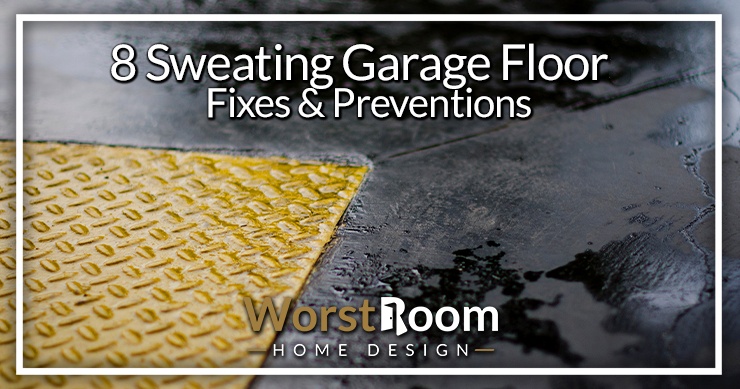
Did you walk into your garage to find the floor wet this morning? It's a common occurrence for homeowners and possible to prevent with the right strategy. Wet concrete floors are a problem in many venues, from your garage at home to commercial warehousing facilities and offices. Mostly, a sweating garage floor is a hazard.
A damp, musky environment not only smells terrible but also provides the ideal setting for mold growth which can adversely affect your health. The wet floor also presents a slip-and-fall risk. Imagine walking into your garage in the morning, slipping and knocking your head. You could end up in a life-threatening scenario.
This post unpacks why you have sweaty garage floors and how to prevent this occurrence. Are you ready? Let’s dive in.
Why Does My Garage Floor Sweat?
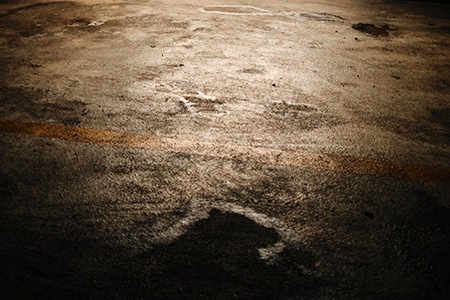
So, what causes your garage floor to "sweat." Condensation is the cause of the problem, and it's caused by moist air contacting the cool concrete on your garage floor, creating a slick surface. When the warm air meets the cold floor, the air cools below the dew point, condensing on the concrete surface.
The result is a damp, sweaty garage floor. This phenomenon even has a term in the concrete industry, "sweating slab syndrome." Sweaty garage floors are more of a problem during the warmer months when air temperatures rise.
In most cases, it occurs in the early morning. The concrete surface cools overnight, and the morning sun warms the air faster than the concrete, accumulating condensation on the garage floor. The sweating problem starts in the mid-spring and ends as the fall begins. It's not a problem in the winter months. You can find the same with a leaking basement floor as well.
Condensation is usually the culprit behind sweating slab syndrome, but it's not the only cause of garage floor sweating. Moisture traveling up from beneath the concrete slab may also cause sweaty floors. Many homeowners mistake this damp phenomenon for sweating slab syndrome, but it's a very different occurrence, requiring another solution to prevent it from happening.
If the concrete floor in your garage has a defective moisture barrier or doesn't have one at all, it leads to moisture rising through the concrete and settling on the surface. Concrete flooring is porous and susceptible to moisture penetration. Going from an unfinished garage to a finished one will bring more benefits than just getting rid of this wet garage floor, too.
Make sure you're not being fooled by something as simple as a freezer in your garage in the Summer dripping condensation which is then draining towards a different part of the garage floor.
Is it a Damp-Proofing Problem Causing Garage Floor Condensation?
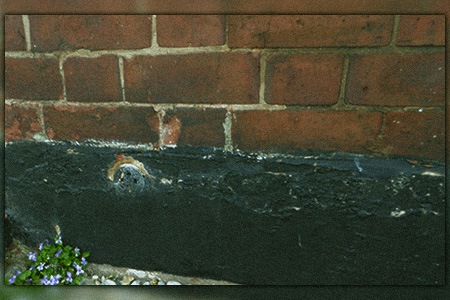
Why is my garage floor wet? Homeowners need to test their flooring to see if they have a sweating problem or a damp-proofing issue. There's a basic method for completing this task without hiring a professional.
Take a 3-foot by 3-foot square of heavy-duty plastic and tape it to the concrete floor in the late afternoon after the surface dries. Ensure you seal all the edges around the plastic using duct tape. This works even though duct tape isn't waterproof. Leave it overnight and remove the plastic when you walk into the garage in the morning.
Examine the surface under the plastic. If it's dry and the rest of the floor is wet, you have a condensation issue, meaning your garage floor sweats. If the area under the plastic is as wet as the surrounding area, you have a damp-proofing problem. Sweating garage floor problems are an easy fix. It will cost you a sizeable sum to fix the problem if it's a damp-proofing issue.
5 Ways to Stop Your Garage Floor From Sweating
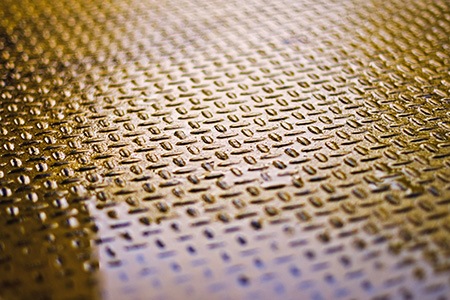
After completing the test, you'll have the necessary information to resolve the issue. Regardless of if you have a sweating issue or a damp-proofing problem, you'll have to take corrective measures to stop it at the source. Simply painting or sealing the floor won't solve the problem.
If you seal the floor, the condensation will settle on top of the surface, and there won't be any change. If you have a damp-proofing problem, it will eventually cause the sealant to bubble and crack, resulting in a terrible-looking job.
So, how do you correct this issue? Let's start by looking at five methods to stop condensation before we move on to how to correctly damp-proof the garage.
Method #1 – Improve Air Circulation in the Garage
The first method for stopping condensation in your garage is to improve the air circulation in the area. If air has time to hang around in the garage, it will condense into water. Installing a ceiling fan or a wall-mounted fan in the garage to keep the air moving solves this problem. Run the fan on a timer and keep it on overnight to prevent condensation.
Method #2 – Decrease Air Humidity in the Garage
The humidity in the air is the main driver of condensation in your garage. Buy a portable dehumidifier and wheel it into the garage. The dehumidifier pulls the moisture from the air, sending it to a tank inside the unit where you can dispose of it the following day. Consider the disadvantages of a dehumidifier, though.
Some models are tankless, and you don't have to worry about tossing out the water. If you have a standard 500-square-foot garage, you'll need a dehumidifier with a 2,500-square-foot capacity rating. Please don't buy an undersized or oversized model, as it won't provide effective results. Speak to a professional for advice if you need help determining which model suits your garage.
Method #3 – Install Garage Floor Mats
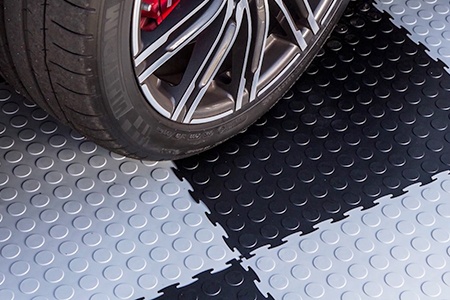
Concrete slabbing gets cold overnight. It loses heat fast, resulting in the sweating effect in the early morning when it's at its coolest. You can counteract the effect by covering the garage floor. Installing flooring negates the high "albedo" of the concrete, meaning it reflects heat but doesn't absorb it well.
By fitting mats to the floor, you prevent the sweating effect, and you get the added benefit of keeping the concrete clean. Some examples of effective flooring for your garage are interlocking plastic floor tiles, automotive-approved carpets, and vinyl mats.
Method #4 – Heat the Garage
You also have the option of heating the garage to prevent the sweating effect. As mentioned, condensation occurs because the flooring gets cold at night. So, by heating the floor, you prevent condensation from occurring.
You could fit underfloor heating into the garage to keep the concrete at an even temperature to prevent the typical sweating garage floor problems. However, underfloor heating systems are expensive. If you don't have this budget, you can always buy a portable heating system and leave it in the garage.
Method #5 – Ensure You Seal the Garage Properly
Most garage door types have poor sealing around the doors. They'll be gaps between the door guide rails and the sides, allowing air to pass through and enter the garage. Blocking these airways prevents warm air from entering the garage, stopping the sweating effect.
There are several insulation kits available to stop air from entering the area. There are pros and cons of insulating your garage that you can explore to help decide how far you want to take the process.
3 Ways to Damp-Proof Wet Garage Floors
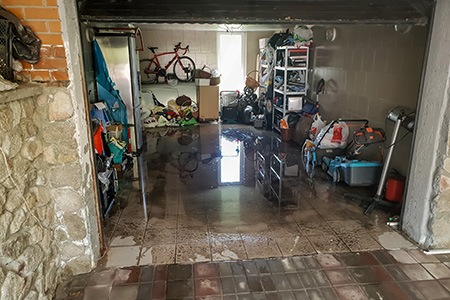
Another set of wet garage floor causes relates to damp-proofing. If you have a damp-proofing problem causing the sweating effect in your garage, you have a bigger issue on your hands than the condensation effect. The bad news is it will be costly to stop the problem. The good news is once you resolve the issue, it's a permanent solution that lasts a lifetime.
It's common for construction companies to skip the damp-proofing of garages to save on costs. Or they might do a bad job on the damp-proofing, resulting in premature failure of the system and a sweaty garage floor. If your garage floor is wet, look into the following methods.
Method #1 – Fit a Damp-Proof Membrane
A damp-proof membrane is the most effective means of stopping moisture from rising through the concrete to the garage floor's surface. The membrane inserts between the hardened core and concrete floor, creating an impermeable layer to prevent the damp rising to the surface.
If you have the budget, look into pouring a new concrete floor. The contractor can fit a liquid membrane, providing a protective layer to prevent moisture from rising to the surface. Instead of inserting a plastic sheet between the layers, contractors paint a liquid membrane directly onto the floor to create an impenetrable barrier.
Method #2 – Use Concrete Sealers & Epoxy Floor Coatings
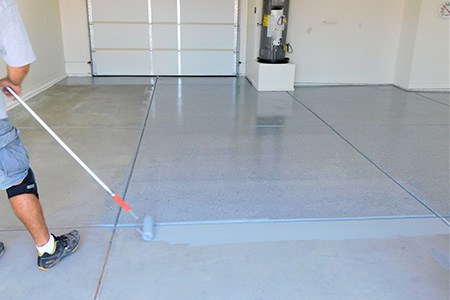
This solution is similar to a liquid membrane. You'll paint an epoxy coating on the garage floor using two coats. Each coat is a thin protective film. After they dry, the surface is strong enough to walk on and park your car without damaging the epoxy coating.
This solution is common in industrial warehouses but is also suitable for your garage. It can help protect cracks after you go through the garage floor crack repair procedure, too. It can smooth those out too so they aren't noticeable as you use your garage for various purposes.
Method #3 – Install PVC Flooring Tiles
Fitting PVC floor tiles are an alternative to using a membrane, providing the longest-lasting solution for your garage floor. Interlocking PVC floor tiles transform the garage surface completely, lasting a lifetime. Installing these tiles creates a permanent barrier keeping out the dampness and dust while giving you a durable garage floor that lasts for decades.
Call a Professional for a Sweating Garage Floor if Needed
If you're unsure if you have a damp-proofing problem or a sweating issue, call the professionals for help. They know how to keep a garage floor from sweating. A local contractor in your area will have the skills to assess your situation and offer the correct solution to resolve the problem.
If it's something as simple as condensation, then a DIY fix might resolve the problem without spending a fortune. However, if you have a damp-proofing problem, you'll need expert advice to resolve the issue. It's a pricey fix but lasts a lifetime. Say goodbye to your sweating garage floor.



